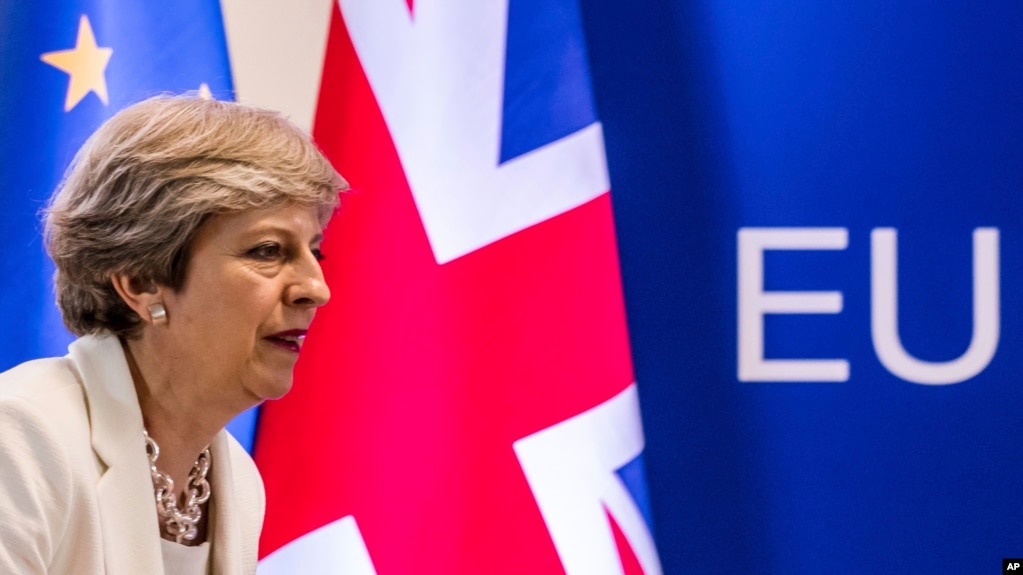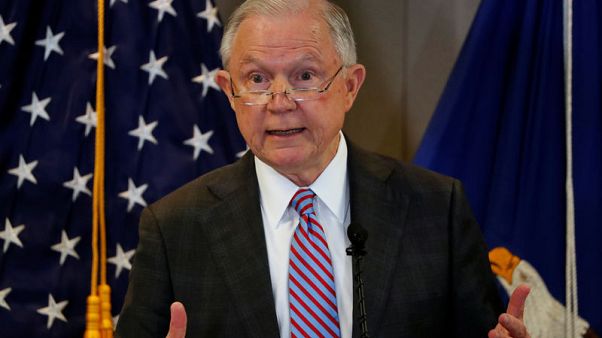European Union negotiators are readying themselves for the collapse
of Prime Minister Theresa May’s government as it lurches from one crisis
to another, say officials in Brussels.
And Britain’s Opposition Labor Party is eagerly standing by, with its
deputy leader warning Thursday that the ruling Conservative government
is so fragile “random events could bring it down.”
“Another Day, Another Crisis,” was the
Daily Telegraph’s
headline Thursday in the wake of May having to fire two key Cabinet
ministers in a week — Michael Fallon as her defense secretary over
sexual harassment claims, and the ambitious International Development
Minister Priti Patel late Wednesday over 14 unauthorized meetings with
Israeli ministers, business people and a high-profile lobbyist during a
family vacation to Israel.
Weakened government
Britain’s beleaguered prime minister and her aides are dismissing
suggestions her government is near collapse, saying her ministers are
“getting on with the job.”
Weakened by her gamble last year to hold snap parliamentary
elections, which led to the Conservatives losing their majority in the
House of Commons, May has been able to hold on to her job because a
split Conservative party has been fearful of what would follow her
departure and which party faction would win a leadership competition,
say analysts.
The ruling party is divided between those who want a clean and total
break with the European Union and those who want Britain to maintain
close ties with the economic bloc, the country’s biggest trading
partner.
This week’s ministerial departures add pressure on May’s minority
government following a string of controversies that she appears unable
to contain — from a burgeoning sexual harassment scandal that is
affecting all parties, but the incumbent Conservatives the worst, and
could lead to the departure of her deputy, Damian Green — to
rebelliousness among her ministers as they maneuver for political
advantage and plot their own policies without paying much heed to
Downing Street.
Along with all of that, several ministers have triggered alarm with
gaffes that have real-life consequences. Demands have been mounting
across the political spectrum for May to dismiss Foreign Secretary Boris
Johnson after he misspoke, when he said a British-Iranian woman jailed
in Iran had been training journalists when she was arrested.
Johnson’s critics say the ill-advised remarks risk Tehran lengthening
the five-year sentence handed to Nazanin Zaghari-Ratcliffe, purportedly
on national security grounds. Her employer, Thomson Reuters, says the
characterization that she was in Iran to teach people journalism is
false. Johnson has since said he "could have chosen his words more
carefully."
“It’s hard to remember a time when a British government was so racked by
crisis after crisis,” acknowledged political writer Sonia Sodha of
Britain’s leftist
The Guardian newspaper.
Few replacement candidates
Sodha believes May could survive until 2019, when Brexit talks are
scheduled to have concluded, if for no other reason than no one else in
the Conservative party wants to take up “the poisoned chalice” of
navigating the country through its exit from the European Union.
And some Conservative lawmakers concede privately that the only
reason they want May to continue is that a leadership upheaval could
trigger an early election which Labor would likely win.
Other Westminster-watchers aren’t as confident that May — a virtual
prisoner of warring party factions over Brexit — can survive much
longer.
“Governments often survive sleaze scandals, recessions and even the
most disastrous of wars. Few, if any, ever recover when they become
laughing stocks, objects of pity and ridicule. That, tragically, is the
direction in which Theresa May’s rudderless government is fast heading,”
according to Conservative commentator Allister Heath.
More challenges ahead
Much will likely depend on whether the sexual harassment crisis rocking
Westminster claims other officials. The government also risks defeat in
the coming days on amendments to EU withdrawal legislation.
Additionally, another key factor in May's survival is likely to come
when later this month, the government reports on the state of the public
finances — they could be worse than expected and require further
unpopular cuts.
Some analysts are likening May’s position to that of a Conservative
predecessor, John Major, whose 1992-1997 government was in disarray
almost from the start due to scandals, divisions over Europe and a
recession. Major was enraged by the disloyalty of his Cabinet and in an
outburst picked up by a television microphone he thought was switched
off, labeled three of his ministers “bastards.” Despite its instability,
Major's government managed to soldier on for nearly five years.
EU leaders aren’t so sure May can repeat Major’s achievement.
For EU, many unknown
Officials say Brussels is preparing contingency plans for May leaving
before the new year and Britain holding early elections months later. An
unnamed European leader told the British newspaper
The Times,
“There is the great difficulty of the leadership in Great Britain, which
is more and more fragile. Britain is very weak and the weakness of
Theresa May makes negotiations very difficult.”
Talks between British and EU negotiators were resuming Thursday in
the sixth round of talks over Brexit. May is hoping her negotiators can
secure a breakthrough and persuade the EU to start moving on to talks
about a future trade deal even before there is a final deal on the
rights of EU citizens living in Britain, what will become of the border
between Northern Ireland and the Republic of Ireland and the “divorce
bill.”
London has suggested that since an agreement is near on the divorce
terms, trade talks should start immediately, but the Europeans have a
different take.
Speaking Thursday, a top EU lawmaker, Sophie in ’t Veld, warned there
has been little progress, saying, “A year-and-a-half has passed since
the Brexit vote and we haven’t moved an inch and the situation is
getting very, very worrying.” She accused the British government of not
being clear about its negotiating position.
Fears are mounting that Britain will crash out of the EU without a
trade deal with its neighbors are mounting. On Monday, U.S. Commerce
Secretary Wilbur Ross warned that losing access to Europe’s financial
markets after Brexit would damage Britain’s chances of negotiating a
successful trade agreement with Washington. His warning came after the
heads of U.S. banks told him they were preparing plans to move staff
from London and relocate them to other European cities.












